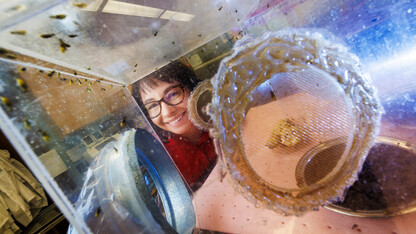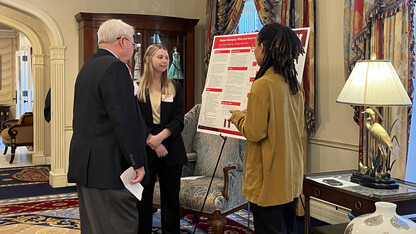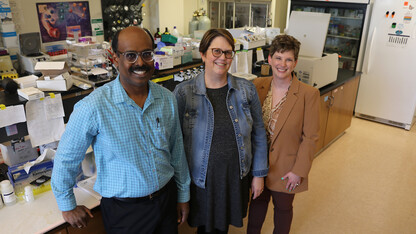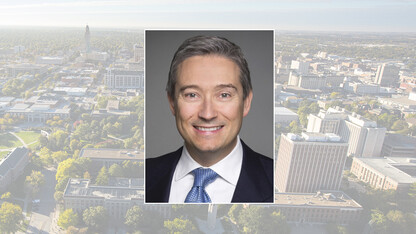· 6 min read
Agronomy and Horticulture seminar series kicks off Sept. 18
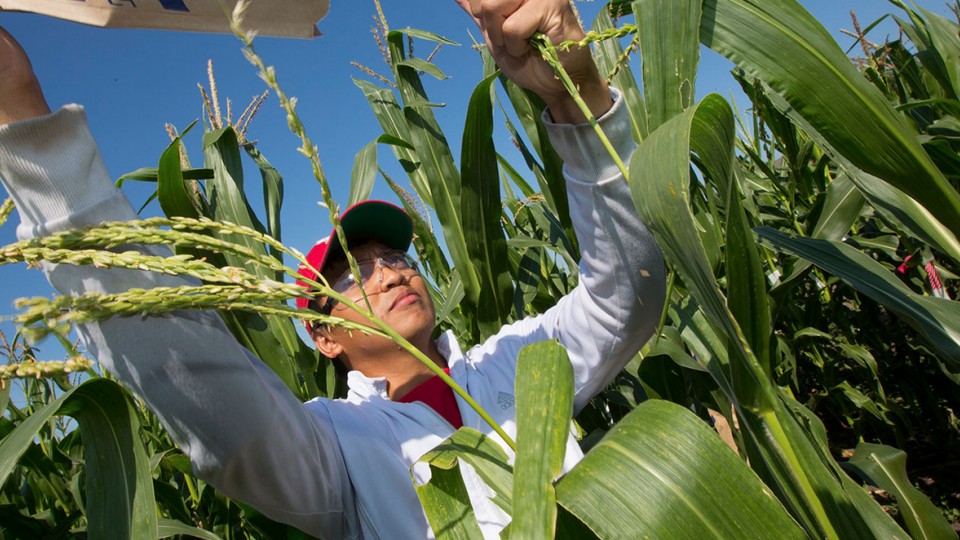
Cody Creech, an assistant professor and dry-land cropping systems specialist with UNL agronomy and horticulture, will present the first seminar. Dryland crop production in the Nebraska panhandle has changed drastically over the last 50 years. The traditional wheat-fallow rotation has given way to complex rotations with diverse crops. The current status of dryland crop production and research will be shared. Future research ideas and opportunities will also be discussed.
All seminars in the series are free and open to the public.
The rest of the seminars will be on the following Fridays:
Sept. 25 – Don Adams, Professor, UNL Animal Science, District Director, West Central Research and Extension Center, will present “Development of resources and research and extension programming at the UNL Water Resources Field Laboratory and Henry J. Stumpf International Wheat Center.” Adams will review the evolution of the commercial farms to laboratories for integrated cropping systems, water conservation and water management. He will discuss opportunities for Research and Extension programming with limited water at the Wheat Center and Water Lab.
Oct. 2 – Dermot P. Coyne Distinguished Lecture: Marco Cristancho, scientific director, Centre for Bioinformatics and Computational Biology, Parque los Yarumos, Manizales, Caldas, Colombia, will present “Keep Enjoying Your Morning Coffee: Research Can Maintain Healthy Beans in Times of Climate Change.” Climate change has caused major reductions in coffee production due to increased incidence of insect pests and diseases, as well as abiotic stresses that are threatening sustainable coffee production around the world. In Latin America, the coffee leaf rust epidemic has caused losses of more than 1 billion dollars. Coffee leaf rust between 2012-2014 caused over 50% reduction in production in Central America affecting more than 5 million people. Recent research has focused on de novo sequencing and assembly of the coffee genome. We have also sequenced the genome of orange rust Hemileia vastatrix that causes the major coffee disease to understand the molecular mechanisms used by this fungus to attack the coffee plant and how this pathogen adapts to a variable climate. Appropriate actions need to be taken in the near future to address the impact of climate change on coffee sustainability. These issues will be addressed in the context of the latest developments by different coffee research groups. The implications of additional research investments needed in order to save your morning cup of coffee will also be discussed.
Oct. 9 – Harkamal Walia, associate professor, plant molecular physiology, UNL, will present “Image-Based Plant Phenomics Approach to Bridge the Genotype-Phenotype Gap.” Walia will discuss the use of image-based approaches to dissect the physiological and genetic basis of abiotic stress tolerance in crops. He will also provide an overview of open-source image processing resources being developed as part of the phenomics effort.
Oct. 16 – Haishun Yang, associate professor, crop simulation modeling, UNL, will present “Crop Simulation Modeling for Crop Irrigation Scheduling and Nitrogen Management.” Yang will discuss ongoing research of using simulation modeling to develop crop management decision support tools for crop irrigation and N management.
Oct. 23 – Josh Davis, IANR assistant vice chancellor for global engagement, will present “Internationalizing the Land-Grant Mission — Opportunities and Challenges.” Davis will discuss trends in the globalization of higher education, describe specific IANR initiatives that are underway, and highlight tools and opportunities for those interested to become more involved.
Oct. 30 – Rhae Drijber, professor, soil microbial ecology, UNL, will present “Arbuscular Mycorrhizal Fungi and Their Role in Modern Agriculture.” Arbuscular mycorrhizal fungi (AMF) are important to plant nutrient acquisition under low input agriculture or from soils of low fertility. Most of our major agronomic crops have well-developed symbioses with AMF, particularly wheat, maize and soybean, that have adapted to modern breeding and agriculture management practices with varying impacts on AMF diversity and function. This seminar will highlight our research on AMF in maize cropping systems, particularly P uptake under high yielding conditions and the impact of N fertilization on AMF biomass and diversity.
Nov. 6 – Lisa Ainsworth, USDA-ARS scientist and associate professor, plant biology, University of Illinois at Urbana–Champaign, will present “Improving Ozone Tolerance in Maize and Soybean.” This presentation will describe the physiological and metabolic basis for variation in ozone tolerance as well as RNA-seq experiments that reveal genes responsive to elevated ozone in the field.
Nov. 13 – Mary Guttieri, postdoctoral research associate and NIFA fellow, UNL, will present “Toward a More Healthful Wheat Crop: Zinc and Cadmium in Great Plains Hard Winter Wheat.” Zinc and cadmium are taken up and transported by plants using the same mechanisms. Zinc is essential for human health, while cadmium is toxic. Increasing atmospheric CO2 concentrations are expected to further depress wheat grain Zn concentration, while human activity is increasing soil Cd concentration in some regions of the world. Breeding strategies to address this paired challenge to producing more healthful wheat are needed. The presentation will review research in Great Plains hard winter wheat germplasm focused on understanding the variation for grain Zn and Cd, the implications for human nutrition, and potential for selection of improved wheat genotypes.
Nov. 20 – Sara Baer, professor, ecosystem/restoration/grassland ecology, Southern Illinois University at Carbondale, will present “Applying Theory in Ecology and Evolution to Steer Community Reassembly and Ecosystem Functioning — How Grassland Restoration is an ‘Acid Test.’” Ecological restoration provides a unique opportunity to test how the environment and evolutionary processes interact to affect the structure of developing communities and recovery of ecosystem functioning. The filter-framework model of community assembly predicts species in a community will be fewer than those that can potentially arrive due to abiotic conditions that prevent unsuitable genotypes from establishing and biotic interactions that prevent species from persisting over time. Environmental heterogeneity and within-species variation represent two filters ecological theory predicts will influence community diversity and ecosystem functioning. Thus, applying theory to guide restoration is an “acid test” of ecological knowledge.
Dec. 4 – Amit Jhala, assistant professor, Nebraska Extension weed management specialist, UNL, will present “Herbicide-Resistant Weeds in Nebraska: Research and Extension.” Repeated and intensive use of herbicide(s) with the same mode of action can rapidly select for shifts to tolerant, difficult-to-control weeds, and the evolution of herbicide-resistant weeds. Weeds have evolved resistance to 22 out of 25 known herbicide modes of action and to 157 different herbicides. Control of herbicide-resistant weeds is one of the greatest challenges for corn and soybean producers in Nebraska. Eight weed species have evolved resistance to several groups of herbicides in Nebraska. Six weed species have been confirmed to be resistant to glyphosate in Nebraska. Research and Extension activities on management of herbicide-resistant weeds will be discussed.
Dec. 11 – Cory Forbes, associate professor, science education and science literacy coordinator, UNL, will present “Fostering Science Literacy in the Elementary Grades: Educational Research on Third-Grade Students’ Learning About Plants.” Forbes will present findings from educational research programs focused on elementary (3rd-grade) students’ reasoning about plant structure, function, growth and development. These findings lay the foundation for a new project to develop, implement, and study the impact of science units that are designed to foster student learning about core life sciences concepts.
